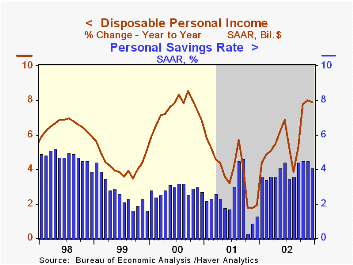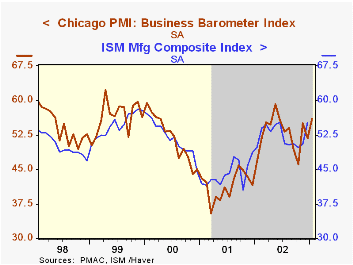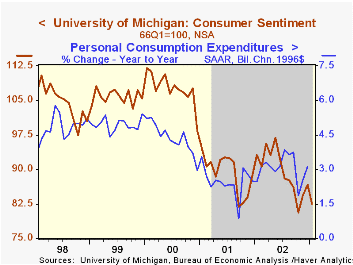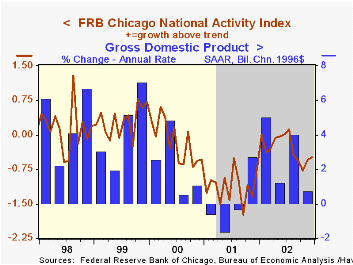 Global| Jan 31 2003
Global| Jan 31 2003Personal Income Firm, Consumer Finances Improved
by:Tom Moeller
|in:Economy in Brief
Summary
Personal income rose twice the Consensus expectation for a 0.2% gain last month. Firm growth in nominal income and tax cuts lifted disposable income growth last year to 5.9%, 4.5% after inflation. These gains raised the personal [...]

Personal income rose twice the Consensus expectation for a 0.2% gain last month.
Firm growth in nominal income and tax cuts lifted disposable income growth last year to 5.9%, 4.5% after inflation. These gains raised the personal savings rate to the highest full year level since 1998.
Further evidence of the consumers' improved financial wherewithal was contained in the recent Survey of Consumer Finances from the Federal Reserve. The report indicated that between 1998 to 2001, "the expansion in equities and the increased values of principal residences and other assets were sufficient to reduce debt as a pro portion of family assets." Click here to view the full report.
Wage and salary disbursements remained firm recently, up 0.3% during the last three months despite lower payroll employment in 4Q. There has been an 80% correlation between y/y changes in wages & salaries and changes in payroll employment over the last twenty years.
Personal transfer payments have been strong of late with higher unemployment, up 0.8% in December and up 10% for the full year. Personal interest income fell for the sixth straight month and was down 1.3% for the full year.
For analysis by the Philadelphia Federal Reserve Bank which examines how technology seems to be the key to the widening wage gap, click here.
Personal consumption expenditures rose more than expected last month. Durable goods purchases rose 6.1%, but for the quarter were down 9.4% (AR). Spending on nondurable goods rose a modest 0.2% and 5.5% (AR) for the quarter. Spending on services rose only 0.2% and 4.3% for the quarter, depressed by a decline in spending on household operation.
Disposable personal income rose 0.4% (7.9% y/y) for the fifth consecutive month. Personal tax payments rose slightly for only the second month all year.
The PCE price deflator was unchanged, pulling the full year change in prices to the lowest level since 1998. Less food and energy, the price deflator also was unchanged last month and up 1.7% for the full year.
| Disposition of Personal Income | Dec | Nov | Y/Y | 2002 | 2001 | 2000 |
|---|---|---|---|---|---|---|
| Personal Income | 0.4% | 0.3% | 4.4% | 3.0% | 3.3% | 8.0% |
| Personal Consumption | 0.9% | 0.4% | 5.2% | 4.5% | 4.5% | 7.0% |
| Savings Rate | 4.1% | 4.5% | 1.3% | 3.9% | 2.3% | 2.8% |
| PCE Price Deflator | 0.0% | 0.1% | 2.0% | 1.4% | 2.0% | 2.5% |
by Tom Moeller January 31, 2003

The Chicago Purchasing Manager’s Index of Business activity rose more than expected in January. Consensus estimates were for a reading of 52.0.
The rise was right in line with the improvement in the Empire State Survey for January and bodes well for the National ISM Index to be released Monday.
Over the last ten years there has been an 86% correlation between the Chicago PMI and the ISM Composite Index.
The indexes of production, new orders and inventories rose, but employment fell.
The prices paid index fell to the lowest level since June.
Visit the Chicago Purchasing Managers website at www.napm-chicago.org.
| Chicago Purchasing Managers Index, SA | Jan | Dec | Y/Y | 2002 | 2001 | 2000 |
|---|---|---|---|---|---|---|
| Business Barometer | 56.0 | 51.7 | 46.6 | 52.7 | 41.4 | 51.8 |
| Prices Paid | 54.2 | 61.8 | 40.4 | 56.9 | 50.4 | 65.6 |
by Tom Moeller January 31, 2003

The January reading of Consumer Sentiment from the University of Michigan fell 5.0% from December to a level of 82.4. That's versus a mid-month reading of 83.7
The index of current conditions rose slightly but the expectations index fell sharply to the lowest level since 1993.
Over the last 10 years there has been a 63% correlation between the level of consumer sentiment and the annual change real PCE. That correlation rose to 80% during the last five years.
The University of Michigan survey is not seasonally adjusted.
| University of Michigan | Jan | Dec | Y/Y | 2002 | 2001 | 2000 |
|---|---|---|---|---|---|---|
| Consumer Sentiment | 82.4 | 86.7 | -11.4% | 89.6 | 89.2 | 107.6 |
by Tom Moeller January 31, 2003

The Chicago Fed National Activity Index (CFNAI) improved slightly last month, but remained below zero for the fifth consecutive month.
The improvement left the three-month moving average of the CFNAI at -0.61, a level consistent with roughly 2% growth in real GDP.. A zero value of the CFNAI indicates that the economy is expanding at its historical trend rate of growth.
During the last ten years there has been a 72% correlation between the level of the CFNAI and quarterly growth in real GDP.
The CFNAI is a weighted average of 85 indicators of economic activity. The indicators reflect activity in the following categories: production & income, the labor market, personal consumption & housing, mfg. & trade sales, and inventories & orders.
For a complete discussion of the Chicago Fed's National Activity Index click here.
A discussion of the CFNAI and its role as a business cycle indicator can be found here.
| Chicago Fed | Dec | Nov | Dec '01 | 2002 | 2001 | 2000 |
|---|---|---|---|---|---|---|
| CFNAI | -0.49 | -0.55 | -0.76 | -0.29 | -1.13 | -0.16 |
Tom Moeller
AuthorMore in Author Profile »Prior to joining Haver Analytics in 2000, Mr. Moeller worked as the Economist at Chancellor Capital Management from 1985 to 1999. There, he developed comprehensive economic forecasts and interpreted economic data for equity and fixed income portfolio managers. Also at Chancellor, Mr. Moeller worked as an equity analyst and was responsible for researching and rating companies in the economically sensitive automobile and housing industries for investment in Chancellor’s equity portfolio. Prior to joining Chancellor, Mr. Moeller was an Economist at Citibank from 1979 to 1984. He also analyzed pricing behavior in the metals industry for the Council on Wage and Price Stability in Washington, D.C. In 1999, Mr. Moeller received the award for most accurate forecast from the Forecasters' Club of New York. From 1990 to 1992 he was President of the New York Association for Business Economists. Mr. Moeller earned an M.B.A. in Finance from Fordham University, where he graduated in 1987. He holds a Bachelor of Arts in Economics from George Washington University.
More Economy in Brief
 Global| Feb 05 2026
Global| Feb 05 2026Charts of the Week: Balanced Policy, Resilient Data and AI Narratives
by:Andrew Cates






